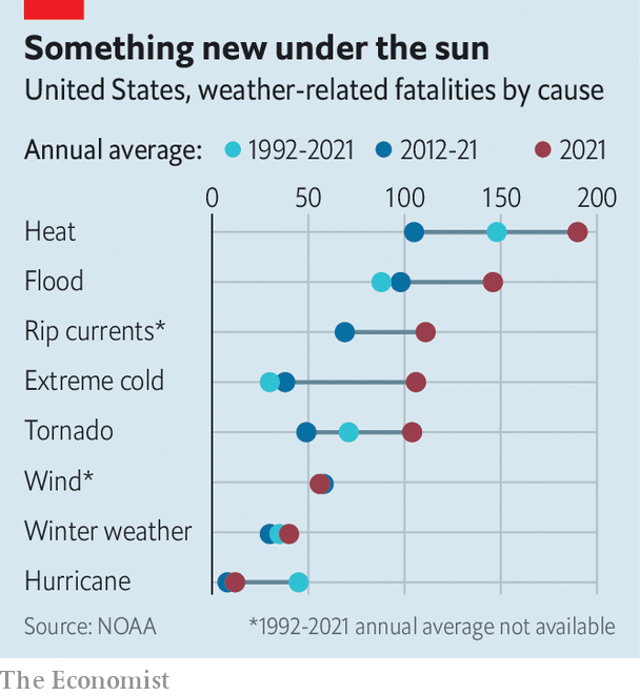This quite a good question, considering that it is one often asked by detractors of climate change concerns.
Frame shift: Benefits? What benefits? From the POV of Canada, a cold country which is explicitly cited as an example in the consultancy.eu report, this whole notion of climate change economic benefits seems highly dubious. Now, if it doesn't even work here, where would it? In a large, aggregate, country-level, sense?
Let's take a strictly utilitarian viewpoint of the likely impacts of climate change to Canada, and for the purposes of this answer, even completely ignore any extinction threats to wildlife.
This is what the study claims:
So the Czech Republic is poised to benefit from any increase in emissions, no matter how intense. The country is not alone in this position. In fact, the analysis suggests that around 70 countries in total stand to benefit from higher temperatures. Fellow cold climate countries Russia, Canada, Mongolia, Finland, Kyrgystan, Norway, Tajikistan, Sweden, Iceland and North Korea are all in the same boat.
Some of what has actually happened/will probably happen to Canada follows:
The British Columbia interior forestry for pine collapsed from 2000-2005 due to a massive infestation of mountain pine beetles. Usually the beetles are kept in check by sufficiently cold winter spells (-35C kills them) but that didn't happen anymore and the beetles ran amok. Logging for the affected tree species has largely been stopped and mills that supported smaller towns shuttered.
Costs?
This study estimates the future provincial economic impacts of the MPB infestation in a dynamic computable general equilibrium (CGE) model, by examining the effects of the reduction in timber supply from BC forests over the 2009–2054 period. Results suggest that there will be a cumulative present value loss of $57.37 billion (or 1.34 per cent) in GDP and a $90 billion decline in welfare (compensating variation) from 2009 to 2054 in BC.
Forest fires, BC and Alberta
From 2003 BC has had 4-5 seasons of extreme forest fires where the provincial government runs up bills of $500M+ in one season fighting fires. That's leaving aside insurance industry impact. Lytton got gutted in 2021 after a heat wave, but Fort McMurray in 2016 was a much higher impact fire, at $9B.
The severe, ongoing agricultural drought across the Prairie provinces is a concerning glimpse into the region’s future climate. Alberta alone is expected to pay out $1 billion in crop insurance as a result of the drought, while Saskatchewan has announced additional measures to support farmers struggling with dry conditions. In Manitoba, drought conditions are currently classified as “extreme” or “exceptional” by the Canadian Drought Monitor –where extreme and exceptional are defined as events that happen once every 20 years or 50 years, respectively. There are different ways of defining drought, so it is important to establish common ground.
Drought events across the Prairie provinces are anticipated to grow in frequency, duration, and severity over the coming decades as a result of climate change. Such a future could be devastating for the region’s economy: the Prairie provinces account for more than 80% of Canada’s agricultural land and more than half of all income generated by farming is earned on the Prairies.
Ice roads are becoming unreliable, High North
Canadian communities in the high North often rely on ice roads. Basically, given the huge distances and low population it is not feasible to build and maintain normal roads year round so instead trucks wait till everything ices up and drive on the hardened ground.
Without those? Air freight, baby. The season for those roads is already getting shorter.
Coastal flooding
I live in Vancouver, BC, which has some very, very expensive real estate. But a significant proportion of it would be at risk with a 90-150cm sea level increase by 2100, which is well within the range of median model predictions. Since we are on an estuary, protection isn't as simple as just recessing constructions a bit from the shoreline, parts of the greater metro area, such as Richmond are just low.
The map below, generated from Climate Central, shows the results of a 1.5C warming with the parts in turquoise under water at high tide (by 2100?) without mitigation. Our airport is also built on a low lying island in the estuary and will need dikes to protect it. Highway 99, linking to the US, would be underwater, as well as the ferry terminal to Vancouver Island. Ditto Richmond, both the city and a lot of farmland around it.
Storms, projected to become more violent, worsen this problem. And this not just a left coast issue, Halifax has potentially $1.9B of real estate at risk.

Housing/construction code will need to be adapted.
Last summer, Vancouver's general area suffered a massive heat wave. BC's coroner reported 559 heat deaths over 5 weeks, with the bulk, 445, during 1 week. One problem is that most residences do not have air conditioning and may not have appropriate ventilation.
I have some personal insight, having recently moved from one highrise to another. My summer '21 apartment faced northeast and really did not heat up all that much. It also had windows that opened up somewhat. The one I am now renting is facing southwest and has much smaller window openings. Both have large glass windows which will absorb heat very well. As a renter, I can just leave it, it is merely inconvenient. If I owned it however, I would have to face retrofitting air conditioning which might not be cheap at all. If heat waves become a recurring pattern, this will likely impact resale value of this type of real estate.
Bear in mind too, Canadian coasts are moderated by the oceans. Inland Canada can get extremely hot in summer, even when it is very cold in winter. Neither are "useful", economically.
Canada looks like it will need a lot more AC. Doesn't come free.
Erratic weather is costly.
Vancouver suffered extreme flooding in November 2021 and was temporarily cut off from most of the roads leading inland. Some of the most productive farming land in Canada, in the Fraser Valley was extensively flooded and then hit by severe frost a few weeks later. Costs? $450M. Government just pledged $228M just for the farmers, though I there may be some overlap between those 2 sums.
Farmers are very concerned about the impacts to their plants, most notably blueberries.
JonathanReez cautions about attributing climate change to the Nov 2021 floods, citing experts who are not convinced about current increased precipitation in the Pacific Northwest. That's a valid point: one event does not a pattern make. Climate change attribution is a probabilistic method: great podcast covering the methods used, 2+ hrs :-(.
However, even in the PNW, extreme rainfall is expected to increase in the future. And the Atlantic coast has seen increasing storms and storm surges in the last decade: we know warmer air soaks up more water.
Insurance premiums
Insurance premiums for flooding and forest fires are definitely on the rise. This is money straight out of consumer/business pockets.
There are possibilities of extra productivity in some cases, but West Coast salmon are in decline due to shallow, overheated, streams and oyster farms report significant die-offs, apparently linked to the effect of acidification on shell formation.
Trade
Though the question, as I see it, is solely looking at the economic effects to Canada, we are also a trading nation. If our trading partners can't afford our products due to their problems, we will ultimately suffer as well, economically.
And if their production costs are driven up by climate change impacts to their infrastructure, our purchases will also be more expensive.
Imagine if our local hipsters were deprived of their avocado toasts. The horror!
Conclusion
A number of these impacts have already happened, in 2022, while the climate models generally predict that it is going to get progressively worse. Against that we might get a longer growing season, supposedly benefiting farmers but see the caveats above, and will get reduced heating bills. Plus, possibly, some economic benefits, to Canada(?), from opening up the NorthWest Passage.
What has already happened has already cost us billions of dollars and is likely to get much worse.
While lowering our emissions will also cost us vastly greater sums of money they will also create new industries and new jobs. Rebuilding after insurance payouts for say forest fires does as well, to an extent. On the other hand some of the costs incurred, like firefighting or drought relief, are straight out losses - they don't generate new jobs or industries in any meaningful sense. Ditto for high-priced properties on waterfronts that need abandoning or hefty view-blocking dikes.
I don't think the math adds up, for Canada. We won't benefit.
To be clear there are 3 types of monetary amounts here.
- Benefits, to Canada itself, of climate change.
- Losses, to Canada, due to climate change.
- Costs to Canada, to fight or mitigate climate change.
My answer here is that 2), the losses, trump 1), the gains. By a large amount. This answer isn't really preoccupied with quantifying 3), the costs of measures to address climate change, because that is not needed to dispute a claim of net gain to Canada.
p.s.
Switching to renewables and electricity rather than fossil fuels, while it comes at a high upfront cost, can save money in the long term. Of course what type of renewables and what type of electricity generating capacity is being used may be tricky to optimize, economically, but that's a different question.
p.p.s. Quick blurb about Russia, the other big Northern country.
(I don't pretend to know much, but it also does not look unequivocally rosy either from this)
In June of this year, regional officials in Stravopol, one of Russia’s major wheat regions, projected a remarkable 40 percent decline in wheat crop in 2020 as a result of droughts.
...
An increase in droughts, floods, wildfires, permafrost damage, and disease could lower GDP by 3 percent annually in the next decade, according to Russia’s Audit Chamber. Climate damage to buildings and infrastructure alone could cost Russia up to 9 trillion rubles ($99 billion) by 2050, according to Deputy Minister for the Development of the Russian Far East and Arctic Alexander Krutikov.
p.p.p.s
At some point there was an ongoing comment thread about lethality risks of heat waves vs other natural hazards, including cold. Well, The Economist covered this on Sept 1st, 2022 - Heatwaves kill more Americans than hurricanes, tornadoes and floods. A picture is worth 1000 words though:


